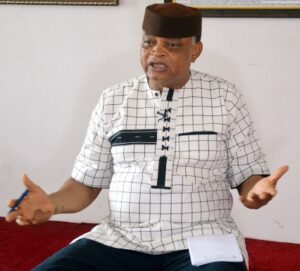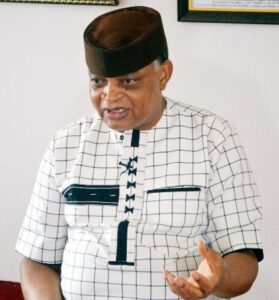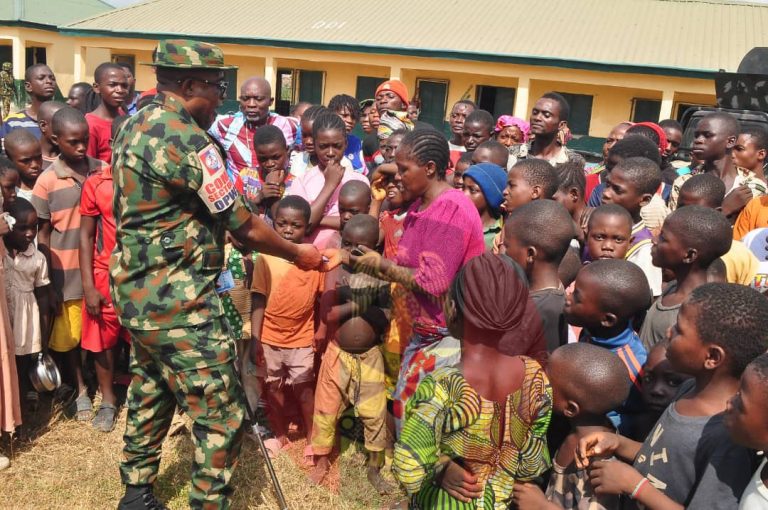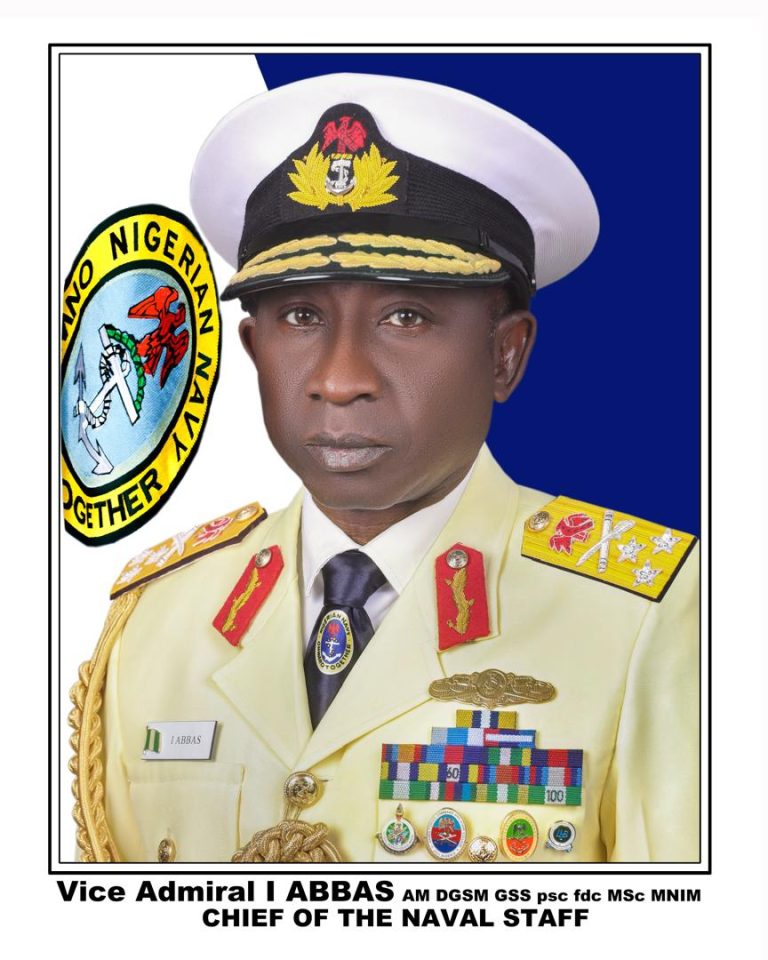The inability of Nigeria security forces to effectively curb the incidence of insurgency in the North-East, herdsmen attack, armed banditry and other violent crimes in various parts of the country is largely attributed to failure of intelligence according to Dr. Ona Ekhomu, a seasoned security practitioner with over three decades of active contributions in security related matters in Nigeria. He spoke extensively on various security-related issues to PEOPLES & POWER magazine editors recently. Excerpts:
How would you describe security challenges in the country today?
The challenges are complex because we have a galaxy of threats facing us. We have adversaries and weapons that we have never seen in this country before. It is so bad that recently, the Emir of Daura said that banditry in the North-West is worse than the civil war, just to give you an idea of how bad it is.
It is complex in the sense that we have banditry in the North-West of the country; huge watts of lands in Niger, Zamfara, Sokoto, Katsina, Kebbi, Kaduna, they all have that problem. In the North-East we have different set of problems, you have Boko Haram insurgency in Borno, Adamawa, Yobe. Now the same is in Gombe and Kano even though they are in denial but they do have that same problem. Bauchi has been a hot bed of Boko Haramism also. They carry a lot of their attacks there but right now they are also in denial. But it’s okay, though it has reduced considerably compared to how it was years ago.

In the Middle Belt you have herdsmen/farmer clashes over struggle for farm lands. The herders want the idle lands, and you know the middle belt is the food basket of the nation. The farmers said no, we need our lands for our yams and other crops. The herdsmen are like saying the colonial masters marked out cattle routes here and we want to follow those cattle routes; but the farmers said; that is not realistic. If you want to follow the colonial masters’ route you have to go back to the United Kingdom and follow them there.
The reality now is that, there’s been transfer of title, whatever that title was, by competent authority under the constitutional authority to whoever owns that land now. You cannot say that because in the 1940s some colonial idiots mapped some cattle routes into the South therefore, it must remain so. We did not have Benue State in the 1940s but we have it now, it is a reality, so deal with it. So that is really my take here.
Still on this insurgency, how would you assess the level of commitment by the government and the security agencies in curbing the menace?
Again, let’s go back to the word ‘complex.’ We have to use it as a reference point. The nature of the challenges is complex; the response by the government agencies is also complex. Let’s look at the dimensions of its complexity; the government in the North-East has finally agreed that it is fighting a war. I remember Mr. President saying that they should root out those people that there is a war going on there.
Now in the North-West where we have the actual invasion of this country by herders from the West Africa sub-region, we do not acknowledge that we are fighting a war. Meanwhile we are losing people more than we would have lost them in a war setting. In the first six months of this year we lost more people in the North-West banditry and terrorism conflicts than about three to four times the number we have lost in the COVID-19 pandemic yet the government is laying focus on COVID-19 and totally ignorant of what is going on in the North-West.
You recently wrote a book titled “Boko Haram Security Considerations and the rise of an insurgency”. What informed the idea of this book?
Well, like I said in the preface of the book, I was very upset that people who at the beginning in 2010 were thought to be rag-tag army irresponsible have been going around killing people. I was very upset because the government can crush these people in a minute or two. But I didn’t know the underlying story until I had to do research on it. And I went in there and found out what their grouse was; that these people were actually wronged by the Borno State government and because of bad policies of fumbling and bumbling it became an insurgency.
First, it was a very low level item but then they developed capability. Also aside from the bumbling and stumbling of the Borno State government, the federal government also committed the same error at the beginning of this crisis and it still has not found its feat yet. What gave the biggest rise to this problem is the failure of intelligence.
For many years, from 2002 to 2009, Mohammed Yusuf was building up capability to carry on a Jihad (the holy war) but our intelligence agencies were asleep. They didn’t know what was going on; such that when this conflict started on July 26, 2009 with their attack in Dutse Tanchy, they were surprised and really did so bad. The military under Gen. Sani Maina was able in July 31 to crush the uprising in Maiduguri. But these guys went under and the Police in this case very stupidly (excuse my friends), assassinated or murdered the leader of Boko Haram.
Now, the first lesson you must learn, I am saying it now to the federal government in case they don’t already know; is that you don’t kill a leader of an insurgency; you never kill a leader of a group of that nature, insurgency or terrorist group as the case may be.
You will always need them to talk down on their members. At a time in point you will need to engage on a peace talk and you will definitely need to talk down their people. This is where the intelligence was mishandled, and we didn’t know that Mohammed Yusuf was the voice of moderation. Mohammed Yusuf was the person who was keeping his attack dogs from going out to attack the public and the chief of which was Abubakar Shekau and you have Mamman Nuru. So this guy has been keeping them in check all this while; they have been pressing for Jihad for a long time and this guy was saying no… no… it is not yet time; we cannot go on Jihad we can operate within the system; let’s go our movement and so on and so forth. And once he was killed, of course, his successors unleashed what we are seeing now.
From your book you said there was a purpose for the insurgent or violence. Could you give us an insight?
Well, the violence is to project or to meet their own goals whatever their goals are. We are their adversaries and they are our adversaries. So the violence is to project their strength and to improve their negotiating position vis-à-vis the federal government. Now what Shekau came out to say clearly was that he wanted the whole of Northern Nigeria to become Sharia compliant which is what was reportedly promised in 2003, for that election to be won by Alhaji Ali-Modu Sheriff, who was trying to become governor in Borno State.
When he went into alliance with Mohammed Yusuf, the leader of Boko Haram he promised him that when or if he won the election that they would have full Sharia in Borno State. After he won the election, he reneged on his word and said it wouldn’t be so. But what he did now is that, he created Ministry of Religious Affairs in his cabinet and made the secretary of Boko Haram, Alhaji Bugufoil, the commissioner. He also put Boko Haram on his payroll as a kind of settling them so that there will be no problem.
But after a while, the people said no, this is not what we agreed; we agreed that we should have full Sharia. So they started agitating for Sharia and there was back and forth. So there was open enmity between Ali-Modu Sheriff and Boko Haram in Borno State such that they made tapes in which (they used to make cassettes tapes to give Islamic sermons) they would abuse the government and others.
So the state government took step to ban the sales of the tape, that they shouldn’t sale those tapes again in the state; and in Mosques where Yusuf used to preach. He then founded his own Mosque in Railway Quarters in Maiduguri which became his headquarters. So the violence was to validate their point of view and ensure they got to the negotiating position where the government would adopt their own agenda which is full Sharia in Northern Nigeria.
Some of the lawmakers have been asking for the resignation and retirement of security chiefs due to their inability to curtail the insurgency in the country. What is your take on this?
I have often said that the service chiefs are at the pleasure of the president. Now the president came out recently and said through the National Security Adviser (NSA), that their best wasn’t good enough. So, the point here is that they work for the president and the president is accountable to Nigerians and if the president feels they cannot do the job, he has the power and prerogative to remove them from office and appoint new ones. But you see, the president has the intelligence, he has the whole information about this country, about the threat against this country, about the capabilities of the officers of the military in his hands. So he is the one who was elected to rule this country and to lead this country. He is in a better position to appoint those he deems fit to be the service chiefs or not. So it is not for Dr. Ona Ekhomu to suggest to him because I don’t have all the information or intelligence to do so.
Based on the record you have, how has the government been responding?
Based on the record, like I said, it is complex. It is a mixed result; they have failed woefully in many instances; and they have done well in some instances also. For example, I remember once upon a time, Nigeria used to be the piracy capital of the world. Pirates took over all our coastal waters but the military has been able to put an end to it. I know occasionally we still get one or two incidences but not as bad as it was when Nigeria was considered a high risk country in terms of maritime trade, but that is not so anymore because government has stood up.
Also, the time Boko Haram had a lot of real estate in Borno State the army came in May 2015, they were very slow but when they took off, by December 31, 2016, they have routed Boko Haram from Sambisa forest. So that is a victory. But now it turned around, Boko Haram came back and they are even here again, even stronger. And there are global issues that are affecting us. For example, the ISIS in Syria is displaced, and now we have our own brand of ISIS here. We have Islamic State of West African Province (ISWAP) which was put in place by Abu Musab al-Barnawi back in 2016 and that has changed the threat because ISWAP has access to a lot of weapons, a lot of hardened fighters and ISWAP can call and bring in fighters from all over to help them. That is why you were seeing from July 2018 a lot of attacks on military bases because these guys were not afraid, they take on hardened targets. Again, it depends on how you look at that, even up till now we are still playing defence. We wait for Boko Haram to attack then we repel.
Could this be the reason behind the divine targets in Chapter 10 of the book?
Divine targets relates to the churches and mosques that they attack, that is attacks on the places of worship. Usually, we know that in times of war combatants normally try to stay away from places of worship because of religious significance and symbolism. But here Boko Haram took the war into the places of worship because they will kill more people in such places. We saw that St. Theresa’s attack in Mandala, the 2011 Christmas day attacks. You saw the Church in Jaji’s attack and so many other Church attacks all over. Then we saw a lot of Mosque attacks too. We saw attacks like Saraki Mosalasi in Kano, the Central Mosque Kano where they killed over 250 people. Those were divine targets they took on and also the Mosque in Adamawa State, newly built; they completely destroyed it.

As a professional in security management, what kind of strategy would you propose to tackle insecurity in some of this volatile part of the country?
We have a complex problem in that if we address a specific threat, maybe farmer/herder clash, it tends to move over to another area and create another problem there. We call it metaphases of threat. You go and hit Boko Haram hard in the North-east. Well, because their fighters are few, you send them away to different locations and regions to go and foment trouble because their job is to cause trouble. They don’t really care or trying to govern. At a time Shekau said they wanted lands where they will rule over and be able to collect taxes the way ISIS was doing in Syria and Iraq but when they saw that it’s easier for the military to defeat them; remember they don’t have our strength, they went back to their guerilla tactics.
What they are doing is to export their fighters, bringing in more ammunition because of porous borders and all. The bandits are almost everywhere even in the bushes in Rivers State. They are attacking people, killing people, kidnapping people and collecting ransom. The bandits in the North-west are also in Edo State, they are in Delta State, they are in Ekiti State; they are everywhere.
So, what I am saying is that, this is beyond Security Chiefs. This is a call for new security architecture; we need to look at how we can use civilian defenders. We can empower vigilance services like the Amotekun in the South-west. I like the idea of Amotekun, they should certainly go forward and improve drastically. I am saying that other states and regions should also advance with their security vigilance services. There was a monarch who cried out in the East that Fulani herdsmen would not let his people go to farm any more. So, I am saying that we need to understand and organize and regularize a vigilance arrangement.
Now, I am not saying anything new; this is what the Algerians did in their 10 years’ war when they had the Islamists in the bush killing people everywhere. We need a local force on ground as the army works with a gainful of massing, with great number of troops, they would not be stationary and they have to move away and the local forces would remain within the communities as vigilance group that would constantly be in contact with the military forces.
It seems the military has militarized everywhere doing the work of the police; why is it so?
In 34 or 35 states of the country just like COVID-19 is in 35 states of the country, the army is running JTF operations because of the nature of extreme violence in existence like the bandits, Boko Haram and herdsmen. I have seen that the police are under-funded and ill-equipped. They are unable to take care of it. With this everybody started calling for the army because when these guys begin their shootings even the army had to think twice and adjust. Let me refer to December of 2003 and January 2004; what happened when the Yobe Talibans (that is what they were called then), the group that broke away from Mohammed Yusuf and went to a village called Karama, Yobe. First, they went to Zara Binyungu, they had a problem with some people there and now moved to Karama Yobe which is only seven kilometers from Niger border to settle there.
The moment they settled and began to arm themselves, they were doing musk etches and shooting and all that. They were preparing for war; this included all kinds of hundreds of people with military background, civilians, university graduates who just abandoned their jobs to go with a guy called Mallam Mohammed Ali who was their spiritual leader.
So one day they attacked a divisional police headquarters in that area, chased the police away; as they had more fire power than the police. So the Governor of Yobe State then, called President Olusegun Obasanjo who in turn authorized the army and that was how the army went there and put them down in January 2004. You know what; the army went there in full force with the Airforce to be able to dislodge the insurgents. They scattered, some went to the Hills of Bosa in Borno State and some went to join Mohammed Yusuf in Maiduguri and so on.
Our major challenge is that we do not analyse past events to determine what exactly happened. How was it that the police was not able to withstand and overcome the bandits then? The same thing happened in Panshakara when they attacked in 2004 and 2005; the same Boko Harm, this one was by Abu Shekau; went and attacked Panshakara Police Station and 21 police personnel. The army had to bombard them for 21 weeks before they were able to defeat them in Kano not even Borno State now. The National Assembly was in place; but where was the NASS information or inquiry into that incident? Why would 21 police officers die in this country and nobody cares; Why?
We are careless and reckless, and the governance of this country is very bad when it comes to the security of lives. Meanwhile that is the first charge the constitution gives us; the security and welfare of Nigerians and we fail them every time.
Do you support the government negotiating with this bandits and/or terrorists?
God forbid bad thing. No, we have a counter way to them. I have already said something about that and it is in the Chapter 15 of my book on Boko Haram. We should build a vigilance service and these people should be paid even the nominal pay of N5,000; and they will secure the whole land. How many people do we have in the military? We don’t even have up to a hundred thousand.
Is the military well-armed?
Well, that is another problem. I don’t know what their armament structure is right now. I know back in 2014 the then governor of Borno State, Shettima came and called out the government that they didn’t arm the soldiers properly. My response to him was; what were his security measures to determine what proper armament was. Now, we know based on reports of clash and events that have occurred that our soldiers are very poorly armed. At least, at that time they have gotten a lot of fresh gears. I know that towards the end of Dr Goodluck Jonathan’s administration there was much push to get arms all over.
With reference to Chapter Four of my book, he has also had much luck; for example, you know there has been a change of government in the United States. Because under Obama administration; we were under sanction; that was why Obama refused to sale us fresh gear (i.e. good weapons). At a time there was a report that Israel was ready to sale to us some attack helicopters and US said no, that Nigeria was in malicious denial because Amnesty International used to write those damning reports that Nigerian troops were violating civil rights of Boko Haram attackers.
I have written severally about that, that it is a war and atrocities happen and when you say civil rights are abused you have to prove it. Those reports were prejudiced, they were very badly written. It is like what happen in the case of Bagawan incidence, April 2014; there was a fire fight between the NIJTF and Boko Haram elements in which 105 persons were killed including six civilians. What happened? Human Rights Watch (HRW) wrote a story saying that Nigerian soldiers went to Baga, killed all the citizens, burnt 2,000 homes and said a lot of negatives things. They said they have satellite imagery of it also. Then Chief of Defence Staff, Admiral Olasaye Ibrahim sent an investigative team led by Maj. Gen. Ubani. They went there and searched everywhere for mass grave they didn’t see. They now showed them 106 graves of 100 Boko Haram fighters and one soldier was killed in that incident and six civilians who were part of the gun fire. But unfortunately at that time, there was a very vocal section of the press that was anti-government and the press was writing all kind of irresponsible statement that the UN should come, that they should harass Jonathan and take over.
In 2002, Mohammed Yusuf took over leadership of this group and at that time they got the nickname Boko Haram because it was radicalized by Mohammed Ali and he now said that book is haram (i.e. western education is haram) is forbidden. They said that western education was producing bad leaders, people who were into all kinds of vices; that the school system wasn’t working; that boys and girls were being mixed up in the shade or school contrary to Islamic religious laws thereby promoting immoral multitude as it were.
The book or boko in traditional Hausa thinking was quite respected because they understood the Quran well. They understood Islam well. Their problem now was that, book was not leading to large scale Islamization; it wasn’t helping to recolonise the religion very well. They now said the book is producing a lot of homosexuality, love of riches and some kinds of negativities. They said that the book was producing that rather than enhancing large scale evangelism to Islam and converting more people to Islam. So that was how, he now reached a conclusion that book/boko is haram (i.e. forbidden). They thought that boko will lead to many more people joining Islam but it wasn’t.
They were against taxation, banking and a lot of things. They now moved away into communes; they were in Jagada Mada in Bauchi; they were in Railway Quarters in Maiduguri and they had their own place in Yobe near Damaturu. So you know, they had their own communes and they didn’t want to be tainted by the society. But that is where intelligence has failed. If they are in communes, what do you think they are doing there they are preparing for war. That’s exactly what is happening today in Rugu forest. Rugu forest has six states around it including Zamfara and Katsina. The foreign herders and their Nigerian collaborators have been in that forest preparing and attacking everything. All those incidences in Southern Kaduna are coming from that place. Kaduna is also aborting the Rugu forest; we have left insecurity to fester for so long and we are not able to do anything. If you allow cancer for too long it will kill the organism.
https://any.peopleandpowermag.com/security-threats-nigeria-should-improve-her-intelligence-service-dr-ekhomu/




